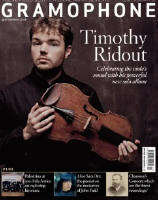Texte paru dans: / Appeared in: |
|||||||
|
|
|||||||
|
It’s hard to believe that the Vivaldi project is three-quarters through, it has seemed so everlasting, so generous and so sumptuous for so long. Yet with the final stretches in sight there is no easing off from the sense of joyful discovery that characterises this project. Vol 72 is an album of choral music that packs a few surprises of its own.
The Dixit Dominus, RV807, is hardly an unknown quantity but this recording is shot through with energetic singing that reveals colourful hues. At times the choir allow their enthusiasm to run away with them but I appreciate their sheer vocal presence, and it is clear from the start that they’re not going to let any opportunity for wordpainting pass. Having said that, I’m also a fan of the more subtle recording by La Nuova Musica (Harmonia Mundi, 5/13), which I consider a masterclass in stylish phrasing, but then I also long for the more resonant acoustic used by Ensemble Pian&Forte (Stradivarius, 2/09) and Musica Fiata (DHM, 11/09). While Giulio Prandi’s new recording doesn’t eclipse the others, it does combine qualities I admire in those into a powerful alternative reading. Listen especially for the two tenors buzzing through the duet ‘Tecum principium’ with voracious energy. The soloists are superb throughout, especially Valerio Contaldo in the fiendish passagework of ‘Dominus a dextris tuis’. We meet more of these soloists with every piece: Carlotta Colombo brings a perky clarity to an otherwise flustered little aria, Sanctorum meritis in C, RV620. And Margherita Maria Sala is in full control of both the typically tub-thumping opening aria of Vos invito, barbarae faces, RV811, and the lush second aria, ‘Sunt delitiae, non dolores’, in which I admire her rich tone.
In the Magnificat, RV611, I find the choir unsettled in the more reflective moments such as the heartfelt ‘Et misericordia’, which is unevenly phrased between various imitative entries. Happily, this doesn’t distract for long, and I’ll still be listening to the stunning ‘Esurientes’ quite a lot in future, I suspect. Warmly recommended. |
|||||||
|
|||||||
|
|
|
||||||
|
Cliquez l'un ou l'autre
bouton pour découvrir bien d'autres critiques de CD |
|||||||
 Traduction".
Traduction".




